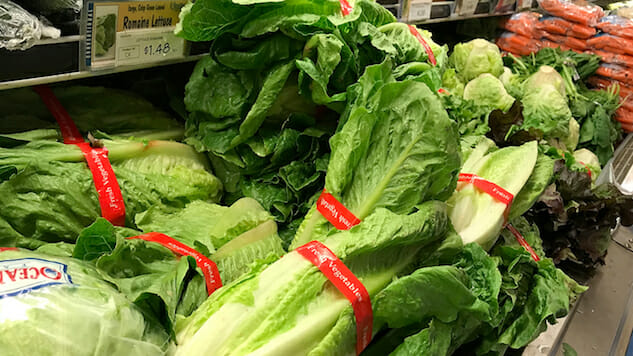Trump Administration Scaled Back FDA Regulations Six Months Before Fatal E. Coli Outbreak
Photo by Justin Sullivan/Getty Politics News FDA
Despite the very recent E. coli outbreak linked to romaine lettuce that sickened at least 210 people across 36 states, causing kidney failure in 27 cases and death in five others, regulation of the safety of the Caesar salad staple is unlikely to be improved by the federal government anytime soon.
The most recent outbreak has been tied back to nationally distributed romaine lettuce grown in Yuma, Ariz., that was likely contaminated by irrigation water, as the same strain of E. coli that sickened these 210 people was also detected in the canal used for irrigation.
Currently, per FDA standards, irrigation water doesn’t have to be tested for dangerous pathogens such as E. coli. Back in 2011, there was hope for improvement following Obama-administration changes that would require produce growers to begin testing for such contaminants starting this year. However, just six months before the recent deadly outbreak, the Trump administration delayed the new regulations for at least four more years.
Irrigation water is often the culprit for the spread of food-borne pathogens such as E. coli and can be especially effective on produce often eaten raw, like lettuce. Something as simple as fecal runoff from nearby livestock can taint local water supplies, such as the aforementioned canal, and then that water supply, when transported unfiltered and untested to be used in irrigation, is spread over produce—produce that is then harvested and sold.
Local growers in California and Arizona—the two states producing well over the majority of the nation’s leafy greens—have recognized the public health crisis posed by contaminated irrigation water, and thus some have taken steps to alleviate the issue. Following the creation of a voluntary safety program in 2007, growers can opt in to monthly self-testing in a practice that has become somewhat commonplace. Unfortunately, even these extra efforts aren’t foolproof as the one farm (out of likely many) that has been identified as a grower of the recent contaminated lettuce ascribes to this monthly self-testing and has for the past 10 years, seemingly meeting federal standards for allowable E. coli levels.
Under the Trump administration’s FDA regulations, produce growers won’t be required to begin annual testing until 2022, after which any grower with an E. coli problem will have an additional two years through 2024 to resolve the issue. This not only pushes testing back six to eight years—depending on the farm—but also only requires yearly testing for a pathogen that has been shown to escape detection even with more frequent, monthly testing.
While some growers are happy with the scaled-back regulations (and the ability to stave off the costly testing process for at least a few more years), the at least 210 people recovering from E. coli linked to what is generally considered a health food likely have a different opinion of the current administration’s cuts.